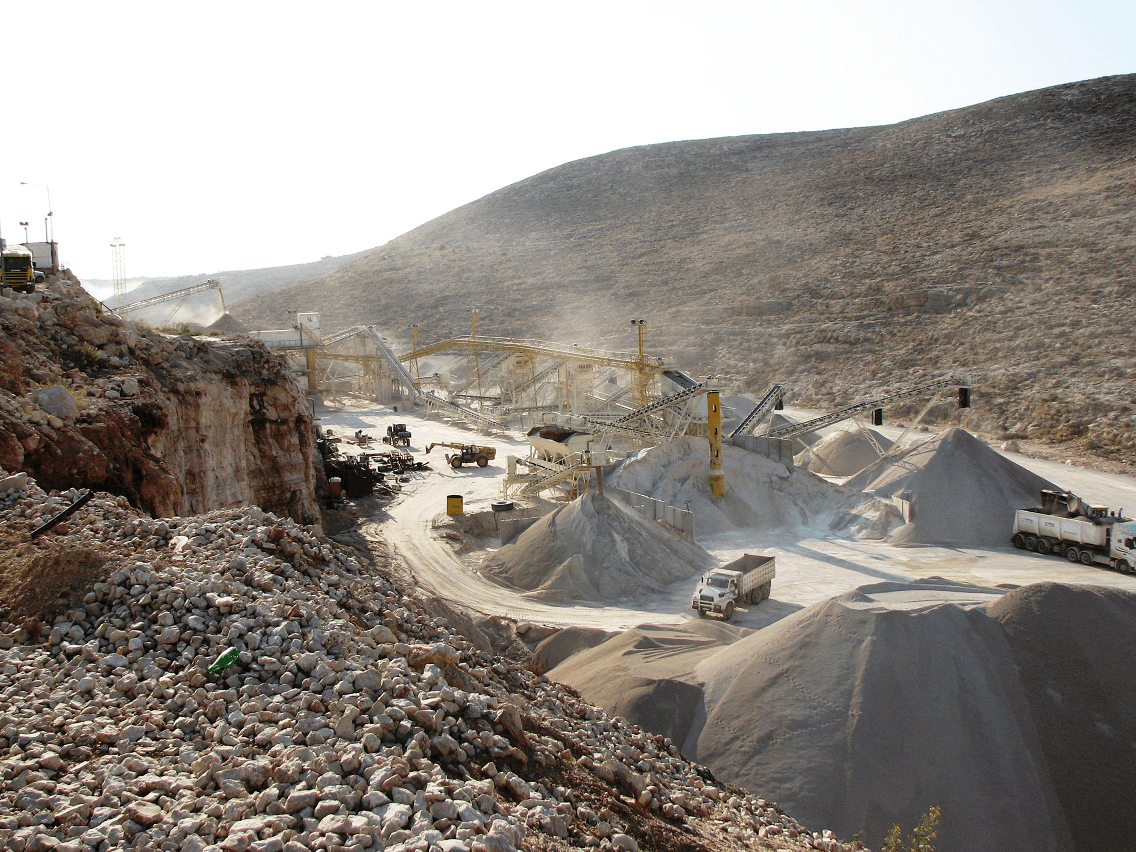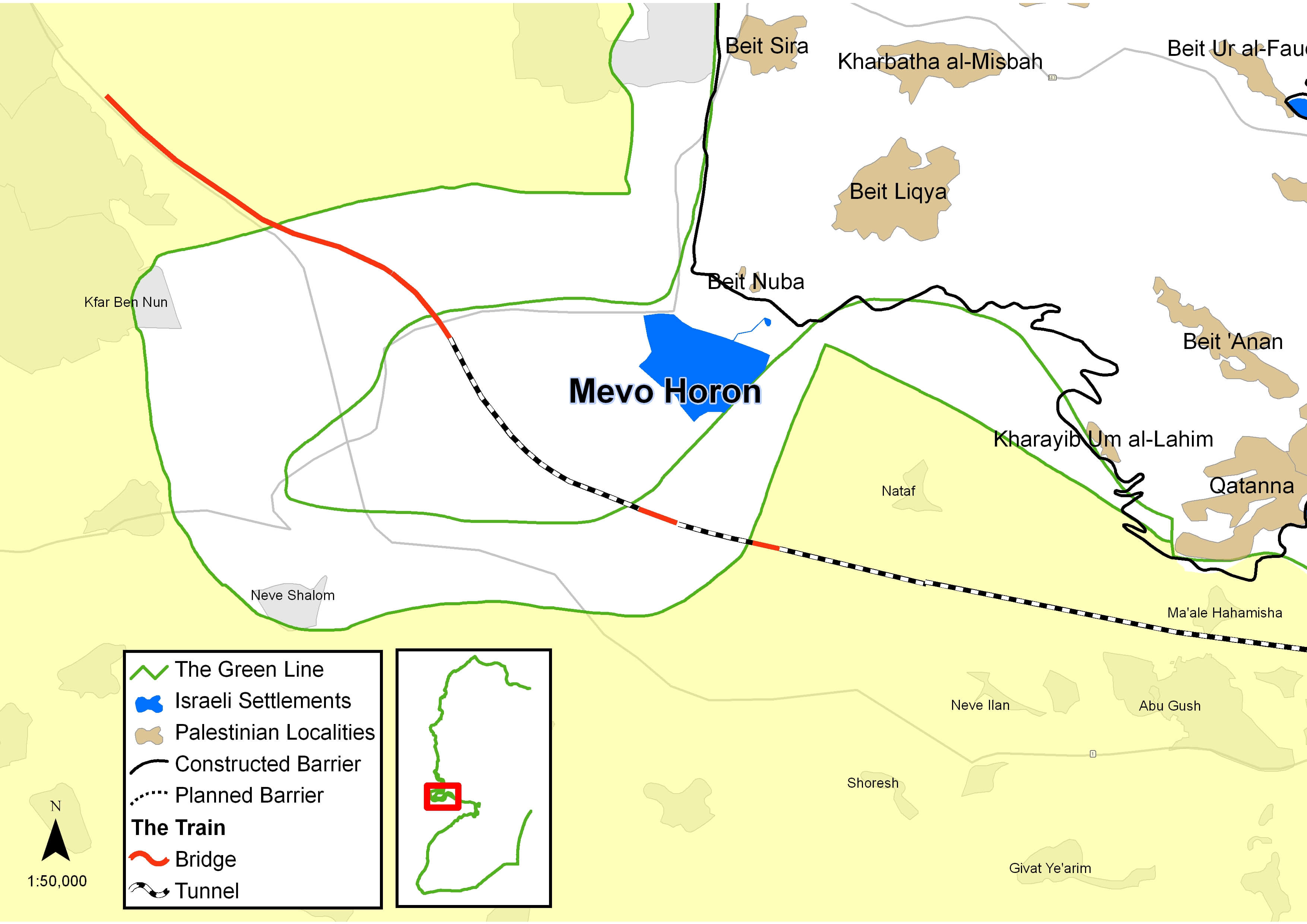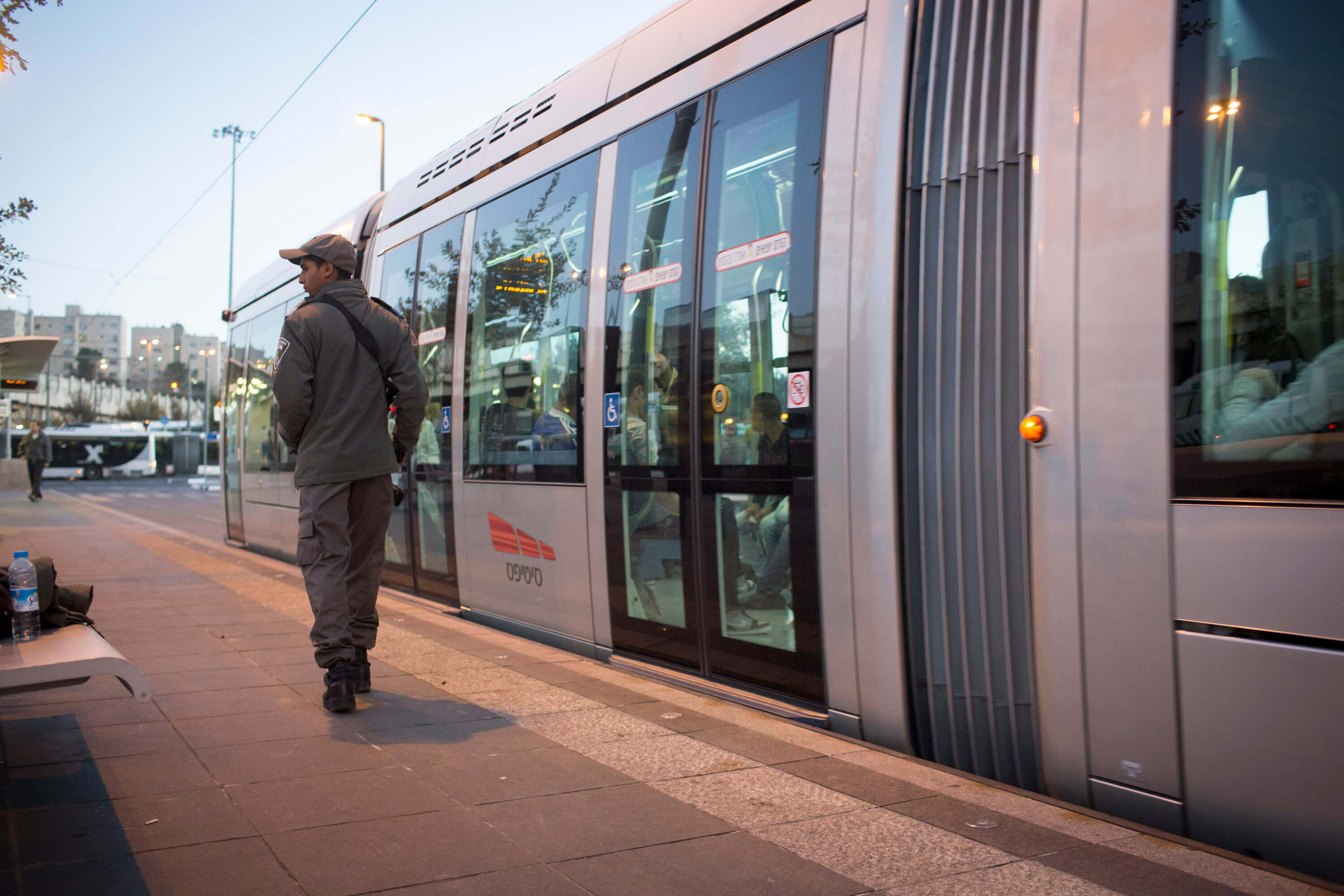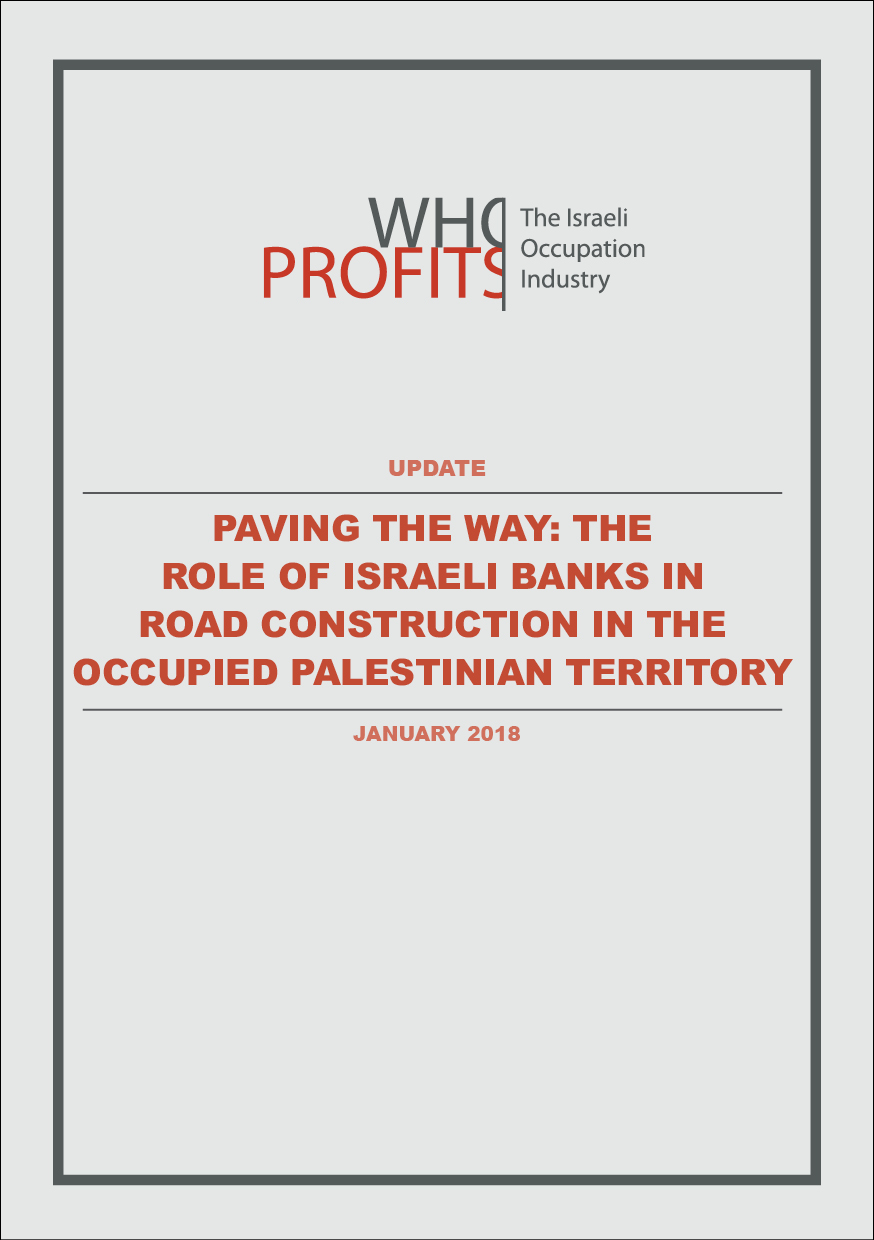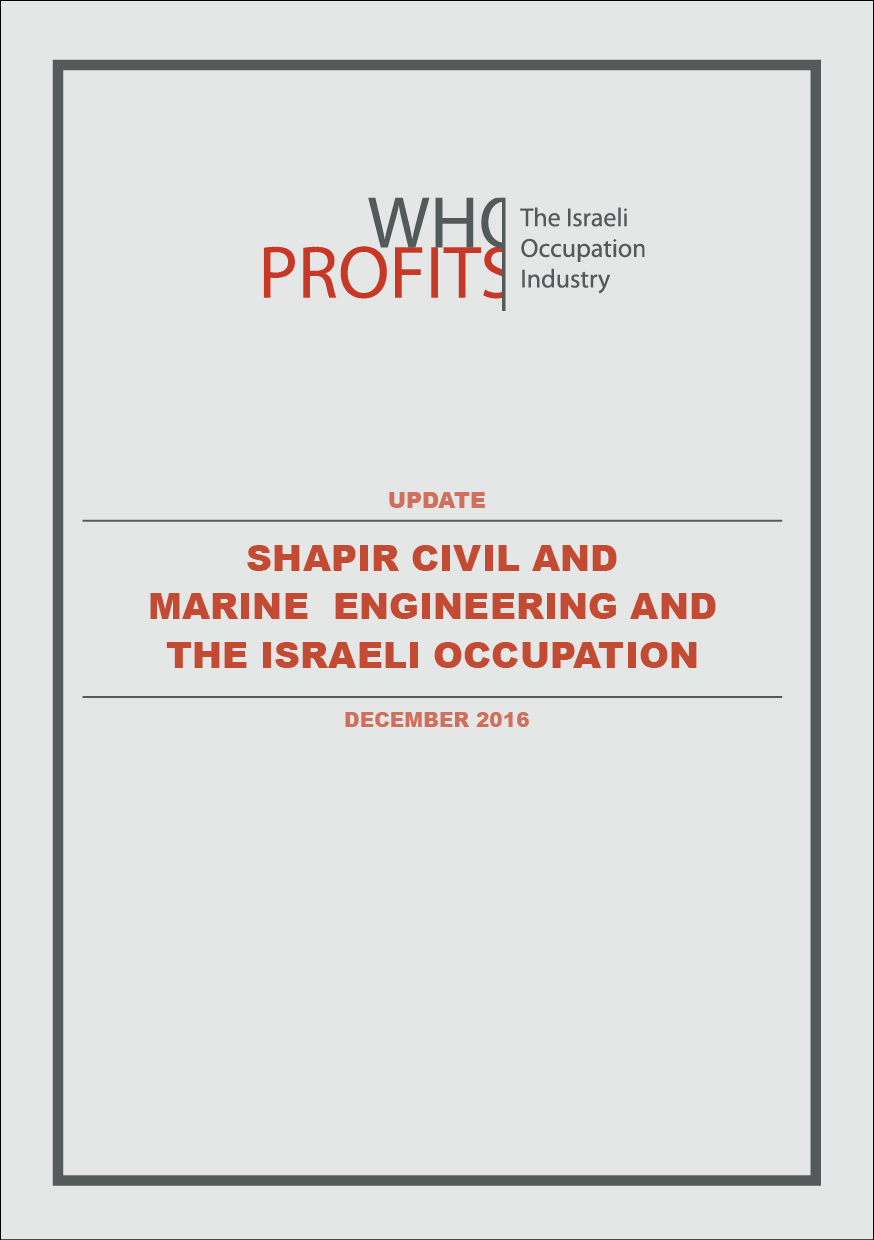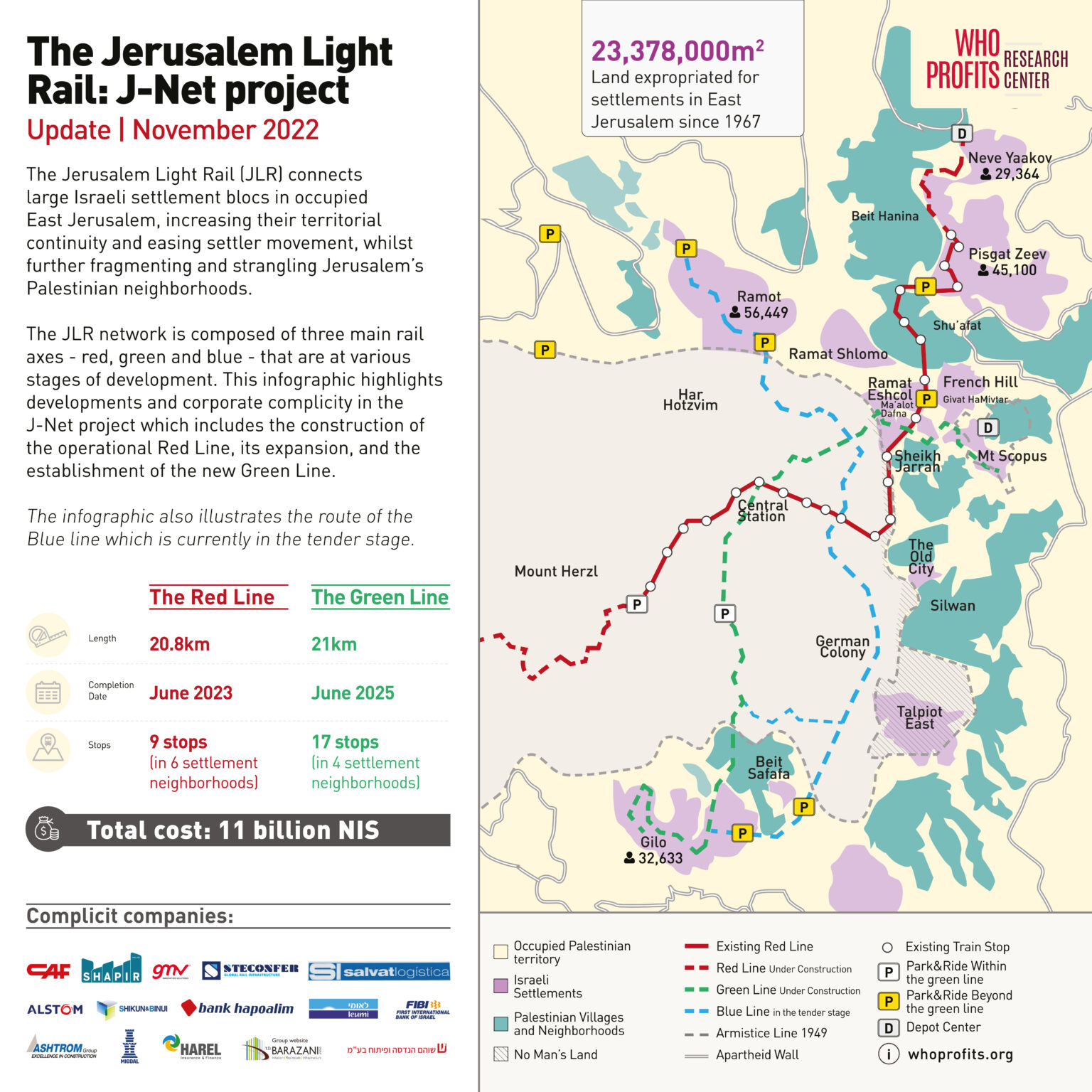Shapir Engineering and Industry

Full Text
שפיר הנדסה ותעשיה בע"מ
Head office: 12 Barakat St., Petah Tikva, 4951780 | Tel: 972-3-9169600
A public Israeli company specializing in infrastructure, Franchise, industry and real estate.
The company operates the Natuf quarry and a concrete plant on 317,000 m2 size land located near the settlement of Nili in the occupied West Bank. The quarry can produce around 3 million tons per year, and the average sales from the quarry reach 1.9 million tons per year.
The company also operates a concrete factory in Atarot settlement industrial zone in occupied Jerusalem.
In August 2022, Who Profits team documented a company truck at the Qalandiya checkpoint in the occupied West Bank.
The Jerusalem Light Rail
Shapir holds 50% in its jointly owned consortium CFIR Light Rail Ltd. (formerly TransJerusalem J-Net Ltd.) together with Spanish company CAF - Construcciones y Auxiliar de Ferrocarriles. In 2019, the consortium won a tender from the Ministry of Finance, the Ministry of Transportation and the Jerusalem Municipality for the J-Net project to expand the Jerusalem light rail (JLR) network, which connects Israeli settlements in occupied East Jerusalem to the western part of the city. The J-Net project, estimated at NIS 11 billion (more than USD 3 billion), includes the construction, operation and maintenance of the Green Line, and the extension, operation and maintenance of the existing Red Line. In April 2021, the consortium commenced the 15-year concession to operate the two lines.
The J-Net project also includes the establishment of a depot in the Neve Ya’akov settlement neighborhood which will include a two-story technical operation building and a parking structure for cars and trains with additional bus terminals; and the expansion of an already existing depot located in the French Hill settlement neighborhood, both on the Red Line route. An additional new depot is to be established in Gilo settlement neighborhood as part of the Green Line route.
The Red Line connects the settlement of Pisgat Ze'ev in occupied East Jerusalem to Mt. Herzel, passing through the city center, and is currently being extended north to include the settlement of Neve Ya'akov. The complete extended route of the Red Line will stretch for about 21 km with 23 stations, passing through the settlement neighborhoods of Neve Ya’akov, Pisgat Ze’ev, French Hill, Givat HaMivtar, Ramat Eshkol and Ma’alot Dafna. The extension work began in August 2021 and it is expected to complete by the end of 2023.
The Green Line route will connect Gilo settlement neighborhood to Mt. Scopus, passing through the city center and the settlement neighborhoods of Ramat Eshkol, Ma’alot Dafna and the French Hill, significantly easing access between the settlement and the western part of the city.
Shapir and CAF also hold 50% each in LAVI Light Rail O&M Ltd. (formerly J-Net O&M Ltd), the Operation and Maintenance contractor of the JLR project.
In November 2021, Shapir carried out construction work for J-Net project in the settlement neighborhoods of Pisgat Ze’ev and Neve Ya’akov, as well as the construction of the new depot in Neve Ya’akov. In January 2022, track laying and construction work were carried out in Pisgat Ze`ev and in Neve Yaakov settlement neighborhoods. For more on the Jerusalem Light Rail expansion, read Who Profits update Spanish Multinational CAF and Israeli Shapir Win Tender to Expand the Jerusalem Light Rail.
Construction on Occupied Land
In November 2021, Who Profits documented a Shapir truck as part of the works on the expansion of Nabi Elyas bypass road in the occupied West Bank. The bypass road expropriates Palestinian land for a project aimed to benefit an illegal settler population. For more on the road, read Who Profits update Roads and Infrastructure Nabi Elyas Bypass Road (Highway 55).
The company has carried out infrastructure projects in the settlement neighborhoods of Gilo, Ramat Shlomo and Pisgat Ze’ev in East Jerusalem, and projects in the settlements of Ma’ale Adumim and Beit Horon in the West Bank.
The company had constructed two bridges and an interchange in Ramot settlement neighborhood in occupied East Jerusalem; a 350 meter long bridge in the Gush Etzion settlement block in the occupied West Bank and the “Eshkol tunnel” under the Israel Police national headquarters in Kiryat Menachem Begin in East Jerusalem.
According to a contract signed in 2012 by Shapir Engineering and Moriah Jerusalem Development Corporation, Shapir was responsible for paving works in the second section of Road 50, referred to as “Begin South” road, including all its extension. Section two is part of the expansion of Road 50 beyond the Green Line, connecting to the settlement neighborhood of Gilo to Highway 60 (the Tunnels Road).
The company was also involved in infrastructure work for the Tel Aviv Jerusalem fast train (A1), which crosses into the occupied Palestinian territory in two areas.
The company constructed a southern section of highway 6 in the Naqab, on an area of approx. 16,300m2 near Laqiya village in a financial scope of around NIS 265 Million. Highway 6 is one of Israeli developmental projects in the Naqab leading to the dispossession of the Naqab’s Palestinian Bedouin communities. For more see Who Profits’ interactive map Tools of Dispossession in the Naqab: Development & Military Projects.
Service to the Israeli Ministry of Defense
In 2020, the company was awarded a contract with the Israeli Ministry of Defense (INOD) to plan, finance, establish, operate and maintain three logistics centers for the Israeli military for NIS 1.25 billion. In addition, by the start of the operation, the company will receive regular payments, reaching a total amount of NIS 5.5 billion.
In 2020, the company joined the "Adopt a Fighter" project. The project allows private companies to adopt units in the Israeli army and support them during their operations. As part of the project, Shapir adopted the "Golani" training base.
A public Israeli company specializing in infrastructure, Franchise, industry and real estate.
The company operates the Natuf quarry and a concrete plant on 317,000 m2 size land located near the settlement of Nili in the occupied West Bank. The quarry can produce around 3 million tons per year, and the average sales from the quarry reach 1.9 million tons per year.
The company also operates a concrete factory in Atarot settlement industrial zone in occupied Jerusalem.
In August 2022, Who Profits team documented a company truck at the Qalandiya checkpoint in the occupied West Bank.
The Jerusalem Light Rail
Shapir holds 50% in its jointly owned consortium CFIR Light Rail Ltd. (formerly TransJerusalem J-Net Ltd.) together with Spanish company CAF - Construcciones y Auxiliar de Ferrocarriles. In 2019, the consortium won a tender from the Ministry of Finance, the Ministry of Transportation and the Jerusalem Municipality for the J-Net project to expand the Jerusalem light rail (JLR) network, which connects Israeli settlements in occupied East Jerusalem to the western part of the city. The J-Net project, estimated at NIS 11 billion (more than USD 3 billion), includes the construction, operation and maintenance of the Green Line, and the extension, operation and maintenance of the existing Red Line. In April 2021, the consortium commenced the 15-year concession to operate the two lines.
The J-Net project also includes the establishment of a depot in the Neve Ya’akov settlement neighborhood which will include a two-story technical operation building and a parking structure for cars and trains with additional bus terminals; and the expansion of an already existing depot located in the French Hill settlement neighborhood, both on the Red Line route. An additional new depot is to be established in Gilo settlement neighborhood as part of the Green Line route.
The Red Line connects the settlement of Pisgat Ze'ev in occupied East Jerusalem to Mt. Herzel, passing through the city center, and is currently being extended north to include the settlement of Neve Ya'akov. The complete extended route of the Red Line will stretch for about 21 km with 23 stations, passing through the settlement neighborhoods of Neve Ya’akov, Pisgat Ze’ev, French Hill, Givat HaMivtar, Ramat Eshkol and Ma’alot Dafna. The extension work began in August 2021 and it is expected to complete by the end of 2023.
The Green Line route will connect Gilo settlement neighborhood to Mt. Scopus, passing through the city center and the settlement neighborhoods of Ramat Eshkol, Ma’alot Dafna and the French Hill, significantly easing access between the settlement and the western part of the city.
Shapir and CAF also hold 50% each in LAVI Light Rail O&M Ltd. (formerly J-Net O&M Ltd), the Operation and Maintenance contractor of the JLR project.
In November 2021, Shapir carried out construction work for J-Net project in the settlement neighborhoods of Pisgat Ze’ev and Neve Ya’akov, as well as the construction of the new depot in Neve Ya’akov. In January 2022, track laying and construction work were carried out in Pisgat Ze`ev and in Neve Yaakov settlement neighborhoods. For more on the Jerusalem Light Rail expansion, read Who Profits update Spanish Multinational CAF and Israeli Shapir Win Tender to Expand the Jerusalem Light Rail.
Construction on Occupied Land
In November 2021, Who Profits documented a Shapir truck as part of the works on the expansion of Nabi Elyas bypass road in the occupied West Bank. The bypass road expropriates Palestinian land for a project aimed to benefit an illegal settler population. For more on the road, read Who Profits update Roads and Infrastructure Nabi Elyas Bypass Road (Highway 55).
The company has carried out infrastructure projects in the settlement neighborhoods of Gilo, Ramat Shlomo and Pisgat Ze’ev in East Jerusalem, and projects in the settlements of Ma’ale Adumim and Beit Horon in the West Bank.
The company had constructed two bridges and an interchange in Ramot settlement neighborhood in occupied East Jerusalem; a 350 meter long bridge in the Gush Etzion settlement block in the occupied West Bank and the “Eshkol tunnel” under the Israel Police national headquarters in Kiryat Menachem Begin in East Jerusalem.
According to a contract signed in 2012 by Shapir Engineering and Moriah Jerusalem Development Corporation, Shapir was responsible for paving works in the second section of Road 50, referred to as “Begin South” road, including all its extension. Section two is part of the expansion of Road 50 beyond the Green Line, connecting to the settlement neighborhood of Gilo to Highway 60 (the Tunnels Road).
The company was also involved in infrastructure work for the Tel Aviv Jerusalem fast train (A1), which crosses into the occupied Palestinian territory in two areas.
The company constructed a southern section of highway 6 in the Naqab, on an area of approx. 16,300m2 near Laqiya village in a financial scope of around NIS 265 Million. Highway 6 is one of Israeli developmental projects in the Naqab leading to the dispossession of the Naqab’s Palestinian Bedouin communities. For more see Who Profits’ interactive map Tools of Dispossession in the Naqab: Development & Military Projects.
Service to the Israeli Ministry of Defense
In 2020, the company was awarded a contract with the Israeli Ministry of Defense (INOD) to plan, finance, establish, operate and maintain three logistics centers for the Israeli military for NIS 1.25 billion. In addition, by the start of the operation, the company will receive regular payments, reaching a total amount of NIS 5.5 billion.
In 2020, the company joined the "Adopt a Fighter" project. The project allows private companies to adopt units in the Israeli army and support them during their operations. As part of the project, Shapir adopted the "Golani" training base.
Related Publications
Be a part of our community
Join Our Mailing List
Shapir Engineering and Industry
שפיר הנדסה ותעשיה בע"מ
Head office: 12 Barakat St., Petah Tikva, 4951780 | Tel: 972-3-9169600
A public Israeli company specializing in infrastructure, Franchise, industry and real estate.
The company operates the Natuf quarry and a concrete plant on 317,000 m2 size land located near the settlement of Nili in the occupied West Bank. The quarry can produce around 3 million tons per year, and the average sales from the quarry reach 1.9 million tons per year.
The company also operates a concrete factory in Atarot settlement industrial zone in occupied Jerusalem.
In August 2022, Who Profits team documented a company truck at the Qalandiya checkpoint in the occupied West Bank.
The Jerusalem Light Rail
Shapir holds 50% in its jointly owned consortium CFIR Light Rail Ltd. (formerly TransJerusalem J-Net Ltd.) together with Spanish company CAF - Construcciones y Auxiliar de Ferrocarriles. In 2019, the consortium won a tender from the Ministry of Finance, the Ministry of Transportation and the Jerusalem Municipality for the J-Net project to expand the Jerusalem light rail (JLR) network, which connects Israeli settlements in occupied East Jerusalem to the western part of the city. The J-Net project, estimated at NIS 11 billion (more than USD 3 billion), includes the construction, operation and maintenance of the Green Line, and the extension, operation and maintenance of the existing Red Line. In April 2021, the consortium commenced the 15-year concession to operate the two lines.
The J-Net project also includes the establishment of a depot in the Neve Ya’akov settlement neighborhood which will include a two-story technical operation building and a parking structure for cars and trains with additional bus terminals; and the expansion of an already existing depot located in the French Hill settlement neighborhood, both on the Red Line route. An additional new depot is to be established in Gilo settlement neighborhood as part of the Green Line route.
The Red Line connects the settlement of Pisgat Ze'ev in occupied East Jerusalem to Mt. Herzel, passing through the city center, and is currently being extended north to include the settlement of Neve Ya'akov. The complete extended route of the Red Line will stretch for about 21 km with 23 stations, passing through the settlement neighborhoods of Neve Ya’akov, Pisgat Ze’ev, French Hill, Givat HaMivtar, Ramat Eshkol and Ma’alot Dafna. The extension work began in August 2021 and it is expected to complete by the end of 2023.
The Green Line route will connect Gilo settlement neighborhood to Mt. Scopus, passing through the city center and the settlement neighborhoods of Ramat Eshkol, Ma’alot Dafna and the French Hill, significantly easing access between the settlement and the western part of the city.
Shapir and CAF also hold 50% each in LAVI Light Rail O&M Ltd. (formerly J-Net O&M Ltd), the Operation and Maintenance contractor of the JLR project.
In November 2021, Shapir carried out construction work for J-Net project in the settlement neighborhoods of Pisgat Ze’ev and Neve Ya’akov, as well as the construction of the new depot in Neve Ya’akov. In January 2022, track laying and construction work were carried out in Pisgat Ze`ev and in Neve Yaakov settlement neighborhoods. For more on the Jerusalem Light Rail expansion, read Who Profits update Spanish Multinational CAF and Israeli Shapir Win Tender to Expand the Jerusalem Light Rail.
Construction on Occupied Land
In November 2021, Who Profits documented a Shapir truck as part of the works on the expansion of Nabi Elyas bypass road in the occupied West Bank. The bypass road expropriates Palestinian land for a project aimed to benefit an illegal settler population. For more on the road, read Who Profits update Roads and Infrastructure Nabi Elyas Bypass Road (Highway 55).
The company has carried out infrastructure projects in the settlement neighborhoods of Gilo, Ramat Shlomo and Pisgat Ze’ev in East Jerusalem, and projects in the settlements of Ma’ale Adumim and Beit Horon in the West Bank.
The company had constructed two bridges and an interchange in Ramot settlement neighborhood in occupied East Jerusalem; a 350 meter long bridge in the Gush Etzion settlement block in the occupied West Bank and the “Eshkol tunnel” under the Israel Police national headquarters in Kiryat Menachem Begin in East Jerusalem.
According to a contract signed in 2012 by Shapir Engineering and Moriah Jerusalem Development Corporation, Shapir was responsible for paving works in the second section of Road 50, referred to as “Begin South” road, including all its extension. Section two is part of the expansion of Road 50 beyond the Green Line, connecting to the settlement neighborhood of Gilo to Highway 60 (the Tunnels Road).
The company was also involved in infrastructure work for the Tel Aviv Jerusalem fast train (A1), which crosses into the occupied Palestinian territory in two areas.
The company constructed a southern section of highway 6 in the Naqab, on an area of approx. 16,300m2 near Laqiya village in a financial scope of around NIS 265 Million. Highway 6 is one of Israeli developmental projects in the Naqab leading to the dispossession of the Naqab’s Palestinian Bedouin communities. For more see Who Profits’ interactive map Tools of Dispossession in the Naqab: Development & Military Projects.
Service to the Israeli Ministry of Defense
In 2020, the company was awarded a contract with the Israeli Ministry of Defense (INOD) to plan, finance, establish, operate and maintain three logistics centers for the Israeli military for NIS 1.25 billion. In addition, by the start of the operation, the company will receive regular payments, reaching a total amount of NIS 5.5 billion.
In 2020, the company joined the "Adopt a Fighter" project. The project allows private companies to adopt units in the Israeli army and support them during their operations. As part of the project, Shapir adopted the "Golani" training base.
Ownership
The company is publicly traded on the Tel Aviv Stock Exchange under the ticker symbol: SPEN.
Major shareholders include: Harel Shapira (15.07%), Israel Shapira (15.07%), Gil Shapira (15.07%), Chen Shapira (15.07%), Clal Insurance Enterprises Holdings (11.23%), Migdal Insurance and Financial Holdings (7.53%).
CEO & Director: Harel Shapira
Chairman: Yehuda Segev
Directors: Gil Shapira, Chen Shapira, Israel Shapira
Subsidiaries
Fully-owned subsidiaries: Shapir Leom Parking Lot Ltd.; Shapir Structures 1991 Ltd.; Shapir Civil and Marine Engineering Ltd.; Hanativ Hamahir Ltd.; Derech Nof- Road 16 Ltd.; Derech Nof Netivei Hatsafon Ltd.; Shapir Housing and Building Ltd.; Shapir Quarries and Industries Ltd.; Shapir Energy Ltd.; Shapir Industries Ltd.; Dasal Merhavim Earthwork Bulk Trasnport Ltd.; Roichman Brothers Shomron Ltd.; Lipscer & Co. Engineering Services (1975) Ltd.; Shapir Engineering for Harish Development; Zephir Park Sibui S.R.L.; North Park Popera S.R.L.
Other subsidiaries include: 6- Cross North Ltd. (80%); Shapir Orian Logistics Ltd. (60%); Shallow Seas Dredging Co. Ltd. (60%); Avrot Industries Ltd. (54.85%); CFIR Light Rail (50%); LAVI Light Rail O&M (50%); Shapir Civil and Marine Engineering- Impresa Pizzarotti- Road 6 (50%); Super N.G. Natural Gas Distribution Company Ltd. (50%); Super N.G. Hadera and the Valleys Natural Gas Distribution Company (50%); As 120 Residence Centers for Senior Citizens Ltd. (53%); Packer Shefi- Steel Construction Ltd. (50%); Shapir Civil and Marine Engineering- Impresa Pizzarotti Road 16 (50%).
Partners
Hapoalim Bank, First International Bank of Israel, Migdal Insurance and Financial Holdings, Clal Insurance, Moriah Jerusalem Development Corporation
* This section refers to the company's general business partners




